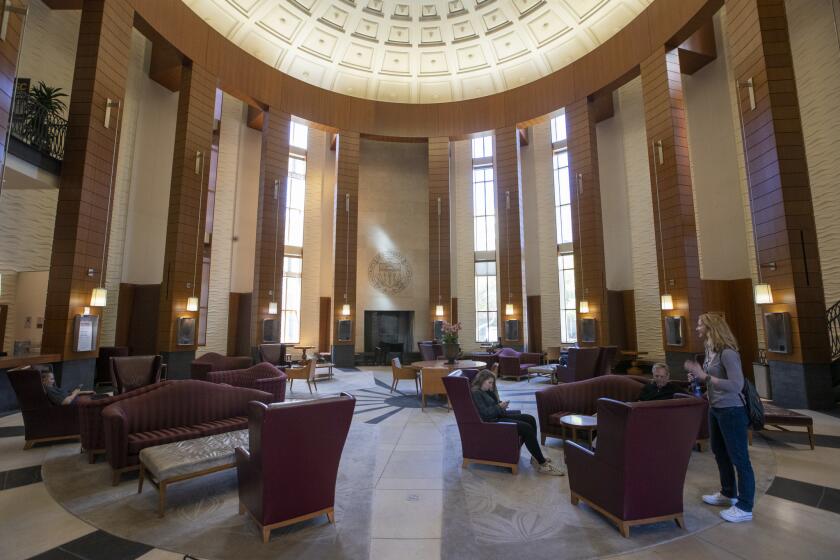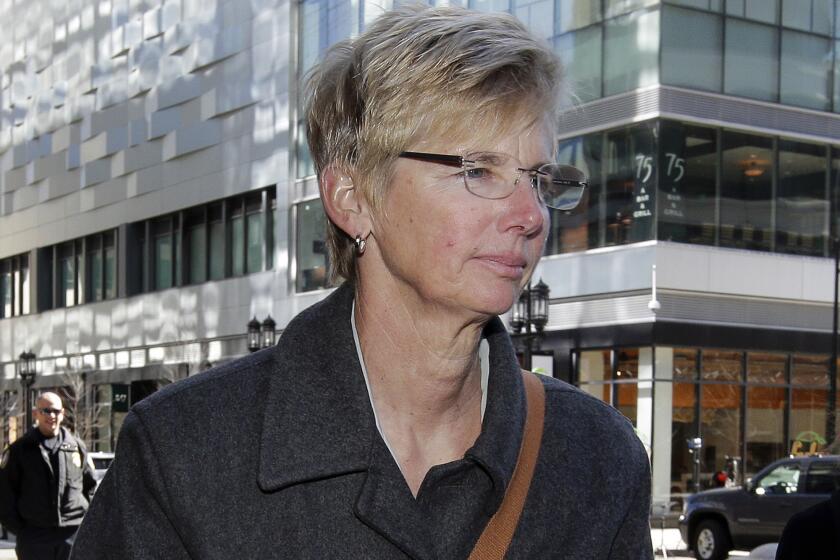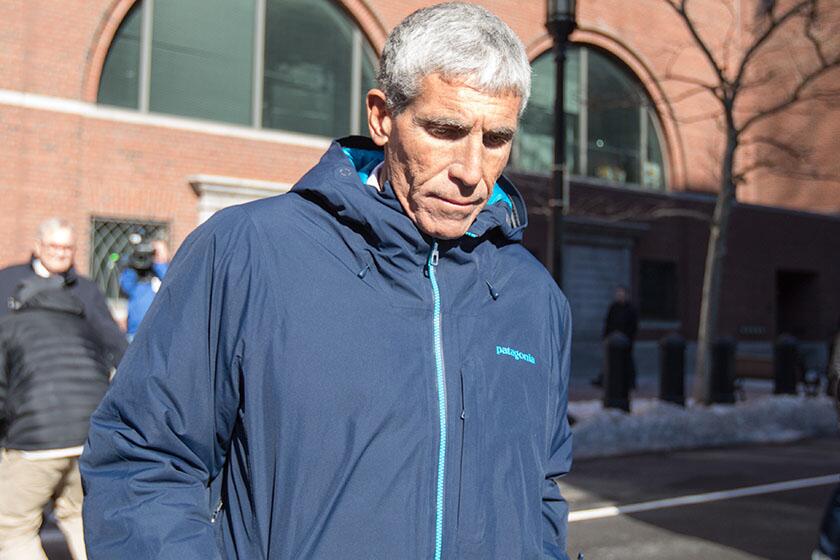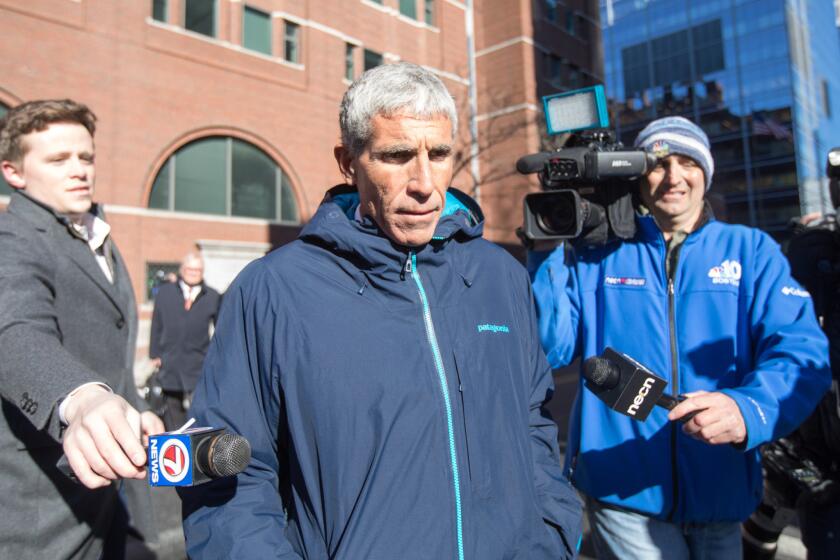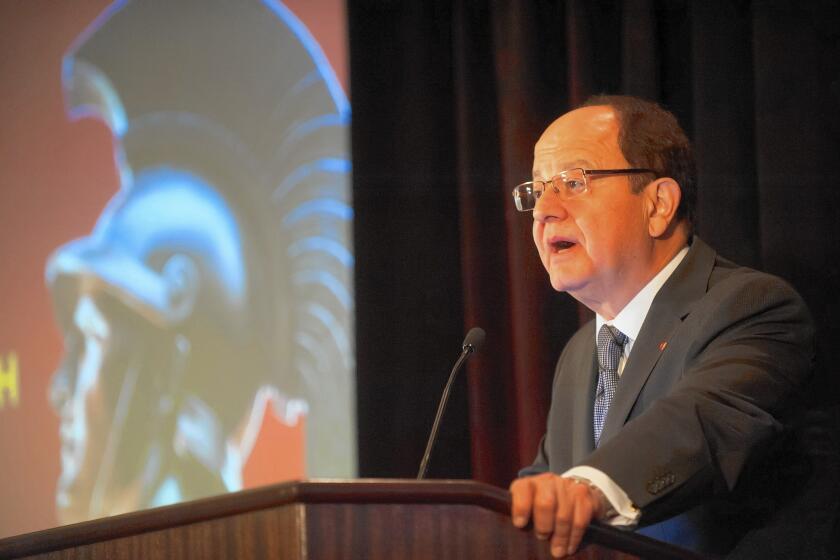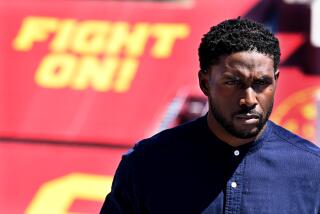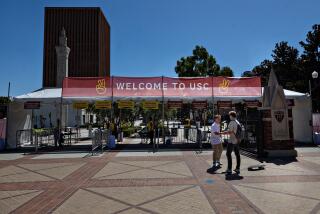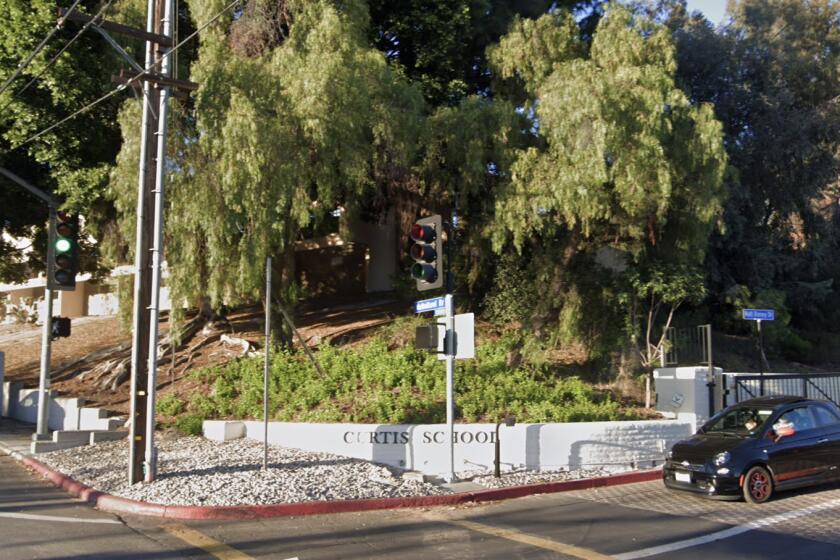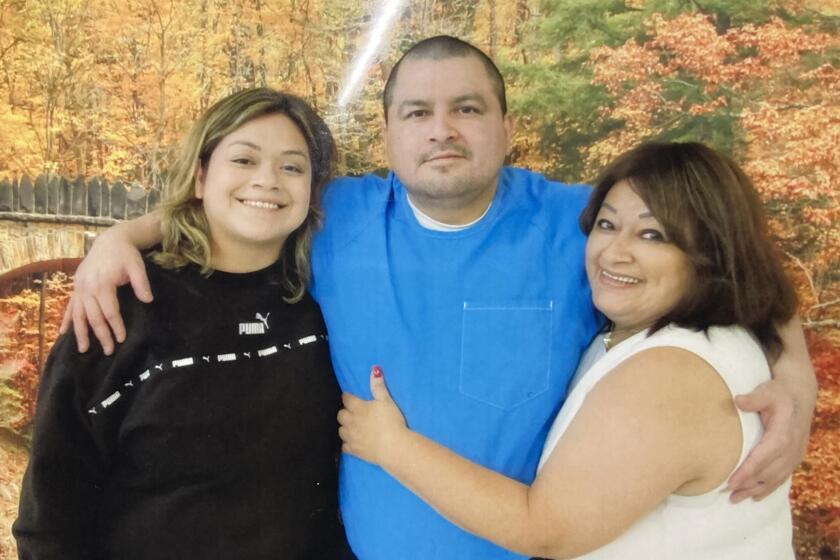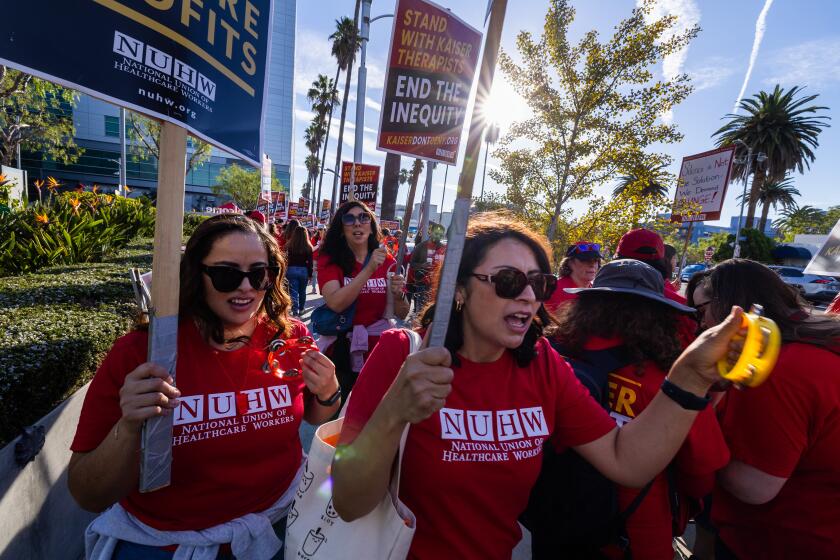
- A Times investigation found that USC quietly offered wealthy and well-connected families an alternative path to admission with much lower academic expectations and an acceptance rate of 85% to 90%.
- Internal records show USC fundraisers anticipated significant donations from families of those admitted and, in some cases, became enraged when money failed to materialize.
- When the Varsity Blues scandal threatened to expose the secret system, the university and some employees involved took steps to keep the details hidden, an effort that continued through at least 2022.
Energy and telecom mogul Sarath Ratanavadi, one of the richest men in Thailand, wanted his son to attend the University of Southern California a decade ago. The admissions officer who reviewed his file, however, termed him a “mediocre student at best” with grades at a Bangkok private school that USC equated to four Ds and two Fs.
But after Ratanavadi donated $3 million to the Trojan golf team, USC found a spot for his son. A special admissions committee for sports recruits admitted the teen as a walk-on golfer.
“I don’t think there is any way he will contribute to us winning or losing,” then-golf coach Chris Zambri emailed a colleague months after Ratanavadi’s son was admitted in 2015. But, he added, “his dad is now a huge supporter of USC Athletics …”
Getting into USC is a daunting feat, with about 9% of undergraduate applicants making the cut. For years, though, the university quietly offered wealthy and well-connected families such as the Ratanavadis an alternative path with much lower academic expectations and an acceptance rate of 85 to 90%, a Times investigation found.
Ratanavadi’s family spokesperson told the newspaper that his donation was “completely separate” from the admission of his son and that, “If any inappropriate conduct took place behind closed doors at USC, the family was unaware of it.”
Thousands of internal university records reviewed by The Times show how an array of administrators manipulated the admissions system meant for athletes to tip the scales in favor of the young relatives of real estate developers, financiers, CEOs, sports team owners, auto dealers and others who were prominent or had the potential to make large donations.
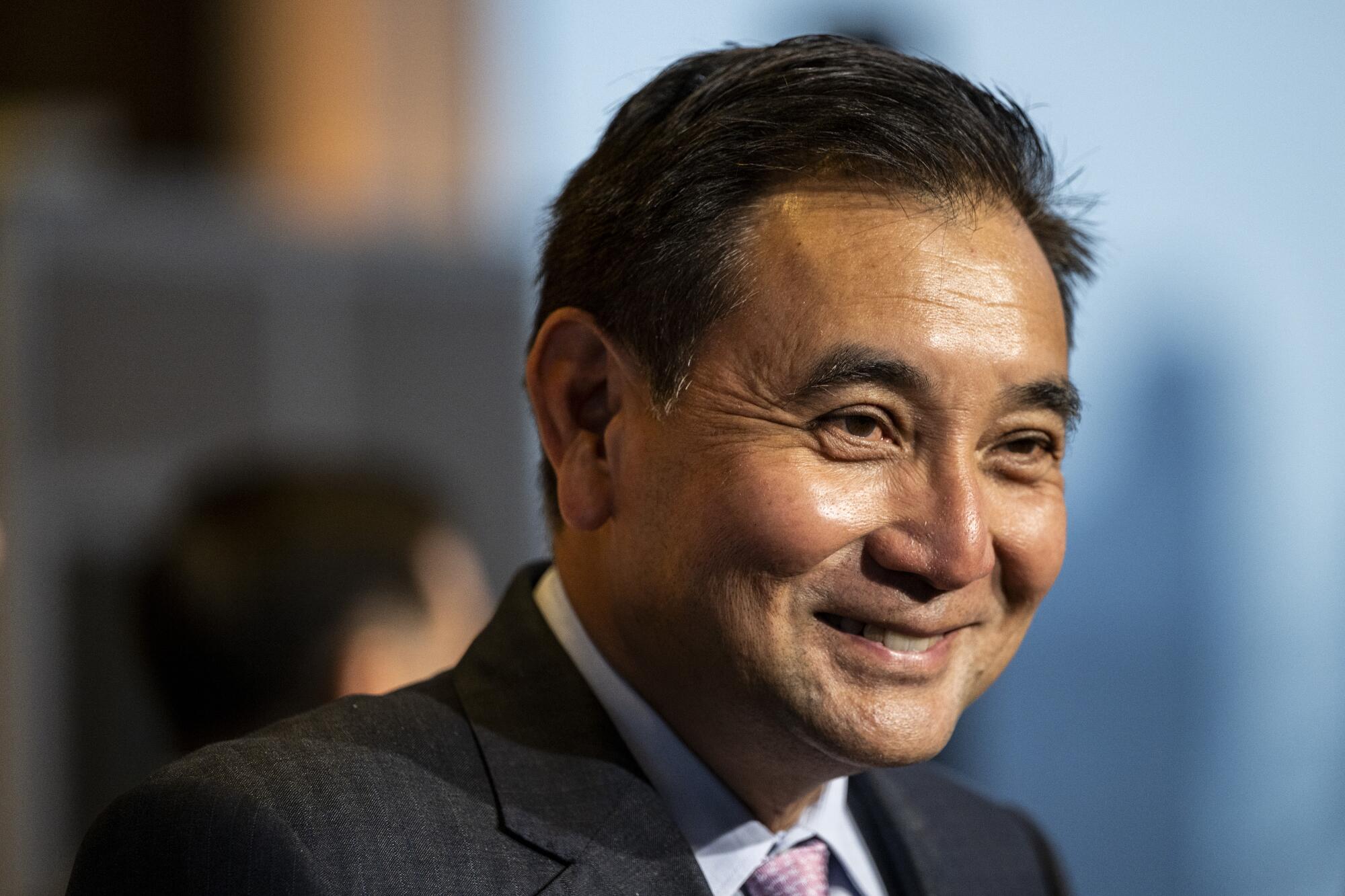
The records pertain to scores of applicants who administrators represented as potential walk-on players for Trojan teams between 2008 and 2018. Though they had played the sport in high school, most were not at the elite level of USC, a storied program that boasts Olympians, national champions and future professional athletes. Once admitted, many of these purported walk-ons never appeared on team rosters.
The university’s entire admissions apparatus came under intense scrutiny in 2019 with the Varsity Blues scandal, in which a rogue college counselor helped clients cheat and lie their way into USC and other schools. The federal case threatened to expose USC’s long-running walk-on system for rich applicants, and the university and some employees involved took steps to keep the unseemly details hidden, an effort that continued through at least 2022, The Times found.
Before the Varsity Blues scandal even became public, USC staffers accompanied by university lawyers told FBI agents and federal prosecutors in interviews that those admitted as walk-ons were legitimate prospects.
When it came to getting their daughters into college, actress Lori Loughlin and fashion designer J.
In federal court filings in Boston, USC and its employees denied the walk-on system was ever used as a fundraising tool. The university fought to keep its records sealed and individuals involved in the system fought to stay off the witness stand. Five former USC administrators ultimately refused to testify under oath, citing their 5th Amendment right against self-incrimination.
That universities shower the children of donors with special treatment is not new, but the documents reviewed by The Times provide an unprecedented level of specificity and detail. At a time when college admissions decisions are debated in the U.S. Supreme Court and state legislatures, the internal emails, spreadsheets, applications and other materials reveal how one university turned the angst and aspirations of moneyed parents into an enterprise that fueled its fundraising efforts.
The Times found that in some cases, USC employees explicitly linked admission to large financial donations, such as with the daughter of Jim Thomas, a La Jolla real estate developer, who was accepted in 2016 as a tennis walk-on. She never played for the tennis team.
“Was there any talk of a donation if we got her in?” USC fundraiser Scott Jacobson wrote in an email to a colleague.
“Yes, I spoke to them about a ‘gift [of] gratitude’ if we got her in,” replied Karen Bowman, a fundraising officer in San Diego. “I told him 6 figures. He understood and seemed ok with this.”
Most families in this story declined interview requests, including the Thomases, who disputed through a lawyer the USC administators’ account. “As a USC alumnus, Jim Thomas regularly donated to his alma mater. He never made a donation approximating a six-figure sum and never suggested that he would,” said the lawyer, Jeffrey Wiesner.
The Ratanavadis’ spokesperson disputed the USC admissions officer’s assessment of the son’s academic record, saying the transcript contained “interim grades, not final marks.” The spokesperson added of the $3-million donation in the year before his admission, “Any claim that this support was transactional or quid pro quo is false.”
Professor Homayoun Zadeh was an institution at USC’s dental school, rising over a four-decade academic career from student to lab director to the chair of the periodontology department.
USC and its employees refused interview requests and did not provide answers to a list of questions from The Times. A statement from a university spokesperson did not address the conduct of USC employees and attorneys in the Varsity Blues litigation. It did acknowledge fraud and other problems in the past in how students were admitted through the athletic department. The university said it could not discuss individual cases because of privacy laws.
“This fraud involved a limited number of employees exclusively in Athletics who are no longer with the university,” the statement asserted. It noted new safeguards in place since 2020 and stated, “We are glad this matter is in the past and that we have learned from it in order to ensure it does not happen again.”
***
‘Good news ... Jersey Mikes coming through’
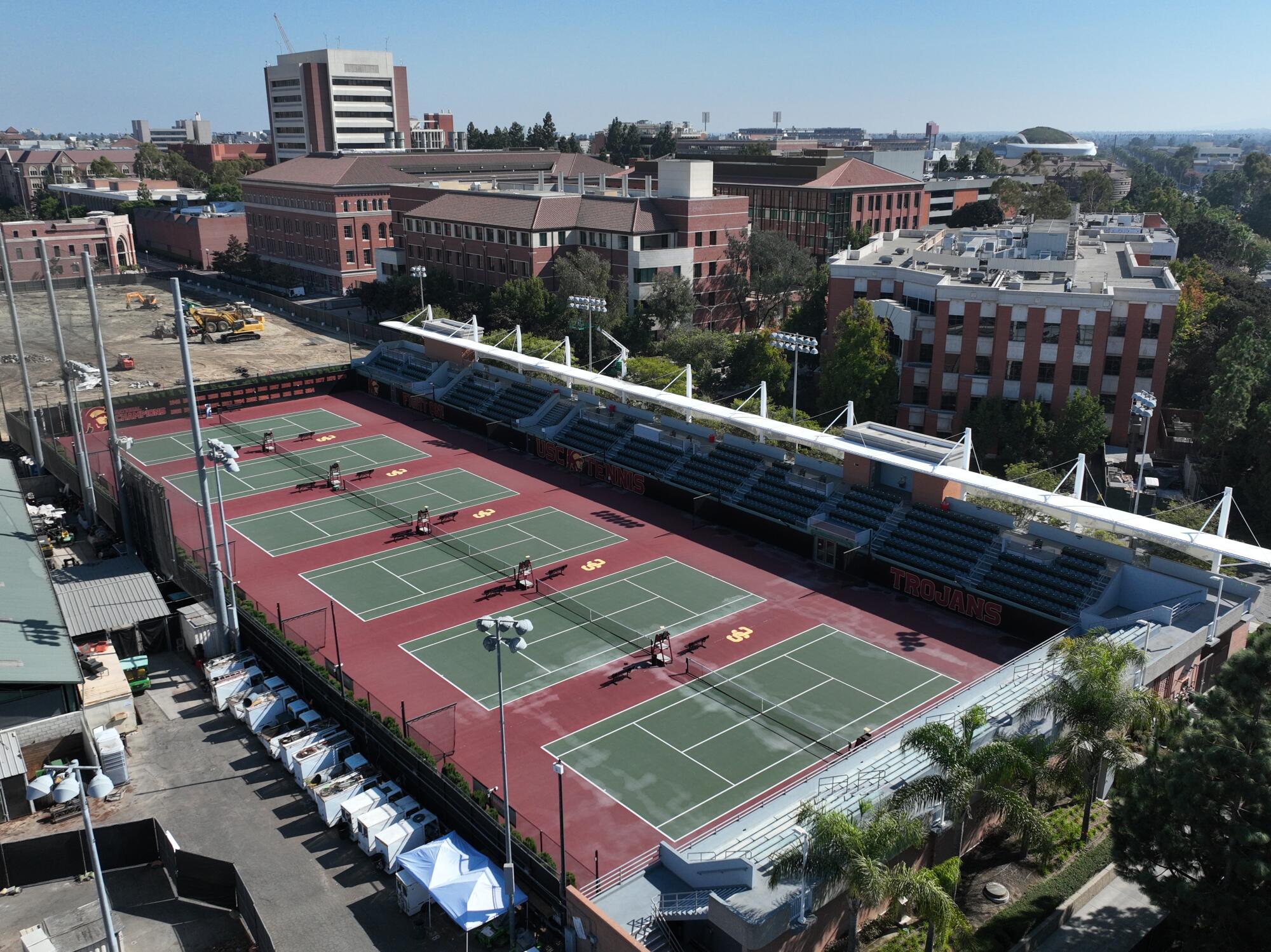
USC often learned of deep-pocketed applicants through word of mouth. Such was the case in 2014 when a Newport Beach executive passed along an intriguing tip to two USC fundraisers.
“The founder of Jersey Mike’s - Peter Cancro is coming to show his son USC…at 1pm,” Kristi Seiter Simmons, the chief financial officer of a company that owned franchises of the hoagie chain, wrote in an email. “I said I would see if anyone could meet with them and give them a little usc pep talk. He would be a major big donor.”
Ronald Orr, then-head of athletic department fundraising, and a colleague arranged their schedules that day to give the sandwich chain CEO, his wife and stepson a campus tour, according to an email memorializing the visit. The discussion turned to how the athletic department could help the stepson bypass the regular admissions process, where his 3.3 grade-point average might prove an obstacle.
“Planning to try walking on with tennis team as discussed,” Cancro emailed senior associate athletic director Donna Heinel after the meeting. (Heinel was later charged in the Varsity Blues scandal and pleaded guilty to wire fraud in connection with her handling of clients of Rick Singer, the counselor convicted of masterminding the scam.)
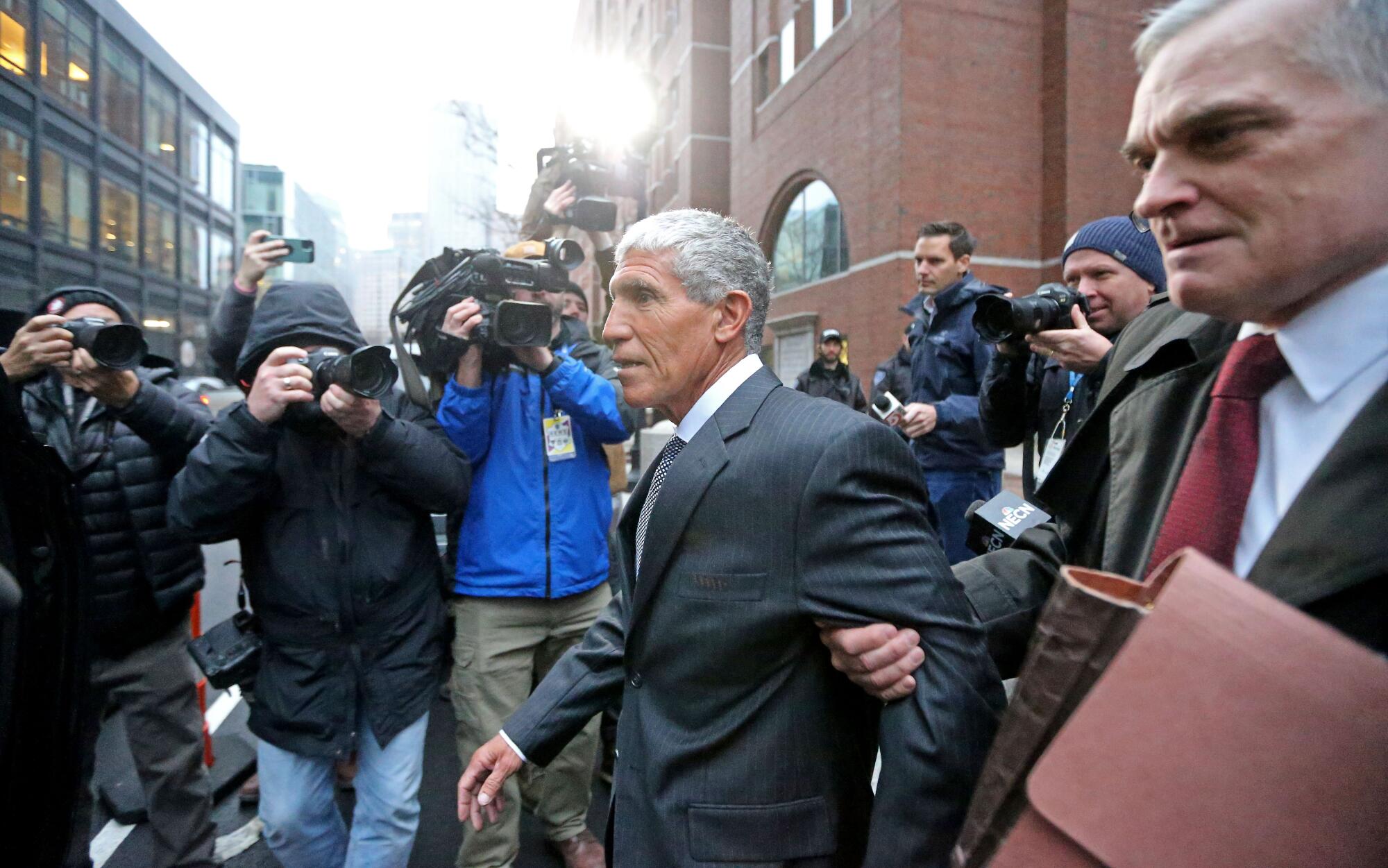
At the time, USC men’s tennis was the most dominant team in the country, having won five of the previous six NCAA team championships. Cancro’s stepson had played tennis for years but never ranked higher than 362nd in his age group, according to a resume he submitted to USC.
In the following weeks, Heinel worked with the stepson to prepare a one-sheet summary of his tennis accomplishments that she would present to a subcommittee of admissions officers checking athletes for basic academic qualifications.
Giving his application a last read before the committee meeting, Heinel stumbled upon a complication.
Donna Heinel, a former USC athletics department administrator, pleads guilty in the college admissions bribery scandal.
“In his essay he states that he became tired of practicing tennis from 5-9 Pm every night so he quit playing tennis,” Heinel emailed his stepfather on Feb.12, 2015. “It is hard to present a candidate as a walk-on tennis player when he states in his essay that he quit playing.”
The records do not reflect how Cancro responded, but the committee approved the teenager for admission two weeks later. His name does not appear on any USC tennis roster.
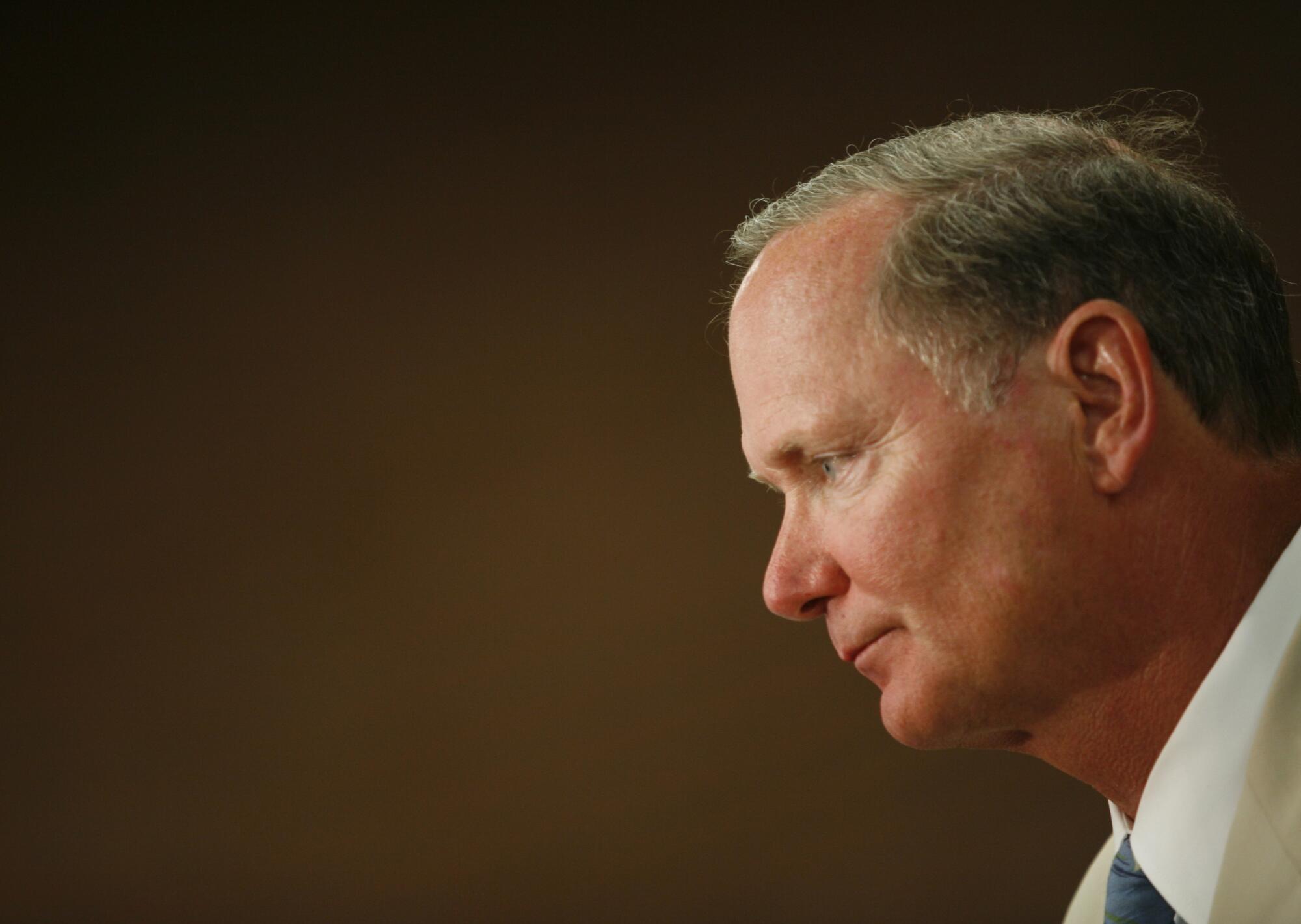
Cancro and his wife made a $500,000 pledge after his admission, according to an email from the couple that Orr forwarded on to colleagues.
“Good news … Jersey Mikes coming through,” Orr wrote. Heinel responded, copying their boss, USC Athletic Director Pat Haden, “Yahoo. It was all worth it.”
Cancro did not respond to messages.
***
A special committee to evaluate prospective athletes
Much of USC’s identity is wrapped up in its success on the playing fields. The university pursues the country’s top high school athletes, and it is willing to accept lower grades and test scores to get them.
At one time, faculty members handled the vetting of recruited athletes for admission, but around 2002, the process moved to a subcommittee within the admissions office, known as Subco, according to an FBI summary of an interview of a USC admissions supervisor. The dean of admissions, the director of undergraduate admissions and a handful of their deputies reviewed packets of information each year for about 200 recruits submitted by the athletic department. The applicants put forward included potential recipients of full or partial scholarships and legitimate walk-ons for whom coaches lacked scholarship slots but wanted on their teams.
The focus of these biweekly Subco meetings was not the sports prowess of the students, which was largely assumed, but their academic records. USC could potentially overlook a transcript of Bs and Cs for a lineman who ran a 40-yard dash in 4.8 seconds or an ACT score of 27 for a pitcher with a 98-mph fastball. But some grades and test scores were so abysmal that the committee doubted the applicant’s ability to function in a university classroom. Mainly for this reason, Subco rejected about 10% to 15% of cases, according to testimony by a USC admissions officer in the Varsity Blues cases.
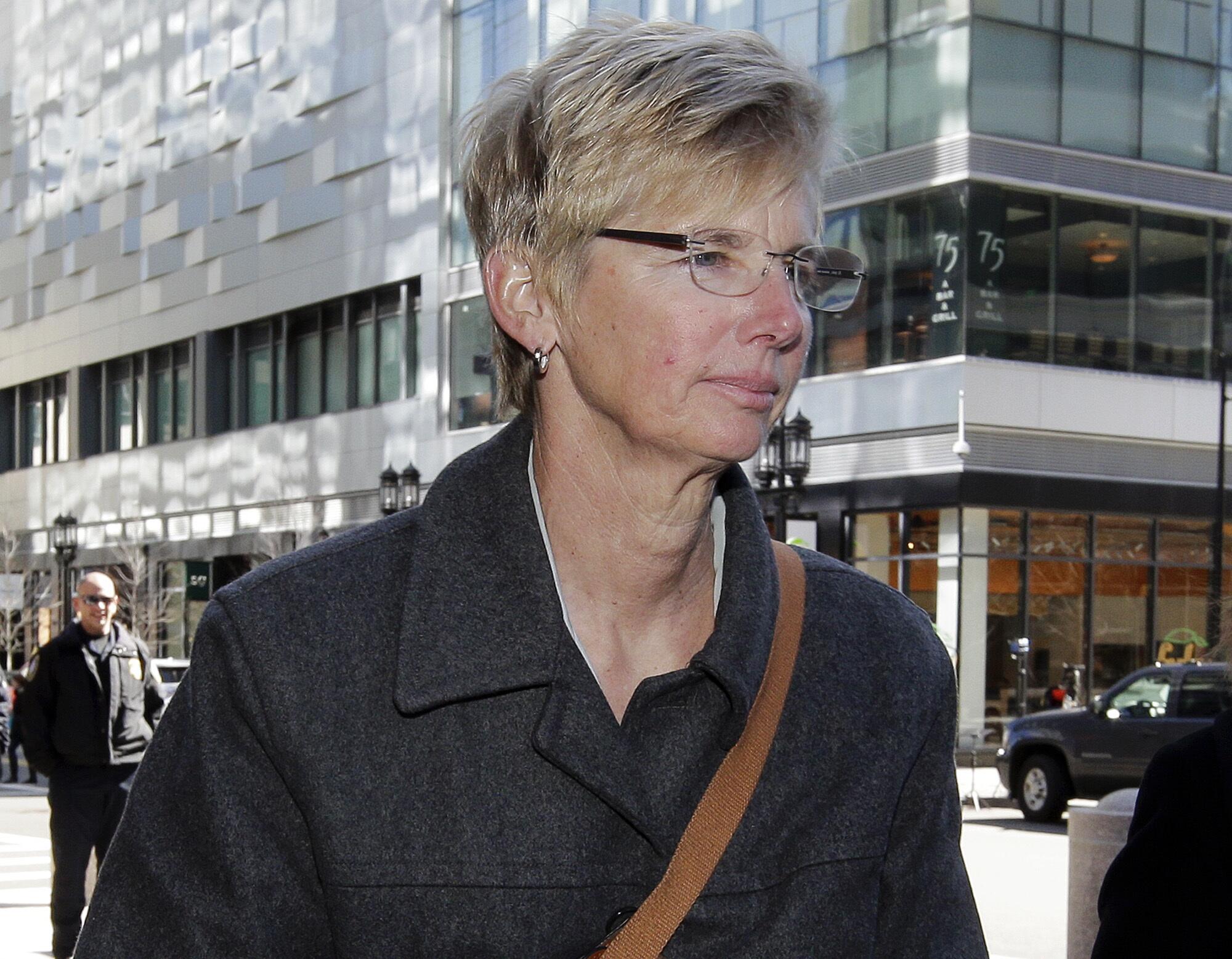
It’s unclear when Subco became a vehicle for fundraising. The university records reviewed by The Times show that, as early as the mid-2000s, teens with thin athletic resumes from some of Southern California’s wealthiest enclaves were admitted as walk-ons. Heinel has said in court papers that she was introduced to the system around 2006 by then-senior associate athletic director Brandon Martin, her supervisor, who had a particular aptitude with applicants from upscale communities south of L.A.
“Martin’s success at this practice started a running joke in the athletic department that he should have a street in Orange County [California] named after him for all the kids he secured admissions for as walk-on student athletes,” Heinel’s attorney wrote in a 2022 sentencing memorandum.
William ‘Rick’ Singer bribed coaches and rigged exams to slip the children of his star-studded clientele into the country’s best universities.
Martin, now athletic director at the University of Missouri-Kansas City, disputed Heinel’s account, saying that walk-on applicants he presented to Subco were “true athletes and legitimate.”
Whenever the practice began, USC was not alone in using athletics in this way. A 2020 state audit conducted in response to Varsity Blues found that the University of California “falsely designated” at least 22 applicants as athletic recruits between 2013 and 2019 “because of donations from or as favors to well‑connected families.”
Some donor children considered by Subco had impressive credentials that might have gotten them in through normal channels. But the walk-on route offered a near-guarantee in the unpredictable and highly competitive admissions process. As a Las Vegas real estate agent pursuing admission for his son explained in a 2016 email forwarded to USC, “I believe that [he] will be admitted on his own merits, however, we both would appreciate a sense of security.”
At USC, the approximately half dozen people who participated in Subco meetings operated with different levels of knowledge about which candidates were the relatives of donors or prospective donors. Some admissions officers had little contact with USC’s fundraising operation and were largely unaware.
Others, such as Dean of Admissions Tim Brunold, had greater insight. Although he oversaw a team of about 80 people who handled more than 65,000 undergraduate applications each year, Brunold carved out time in his schedule to meet personally with potential donors and their college-aged relatives recommended by the athletic department, including Ratanavadi and his father, according to correspondence memorializing the visits. He also regularly received spreadsheets of applicants favored by athletics, such as a 2015 list that displayed Ratanavadi’s son’s SAT scores and GPA with the notation, “$3mil to Men’s Golf-Thailand.”
The connection between USC’s sports program and the very wealthy grew when Haden took over as athletic director in 2010.
An All-American Trojan quarterback who later played for the Rams, Haden had spent decades as a partner in the private equity firm Riordan, Lewis & Haden. Although a novice to collegiate administration, he was at ease in country clubs and boardrooms, and he had a network of entrepreneurs and investors, some eager to have their children attend USC.
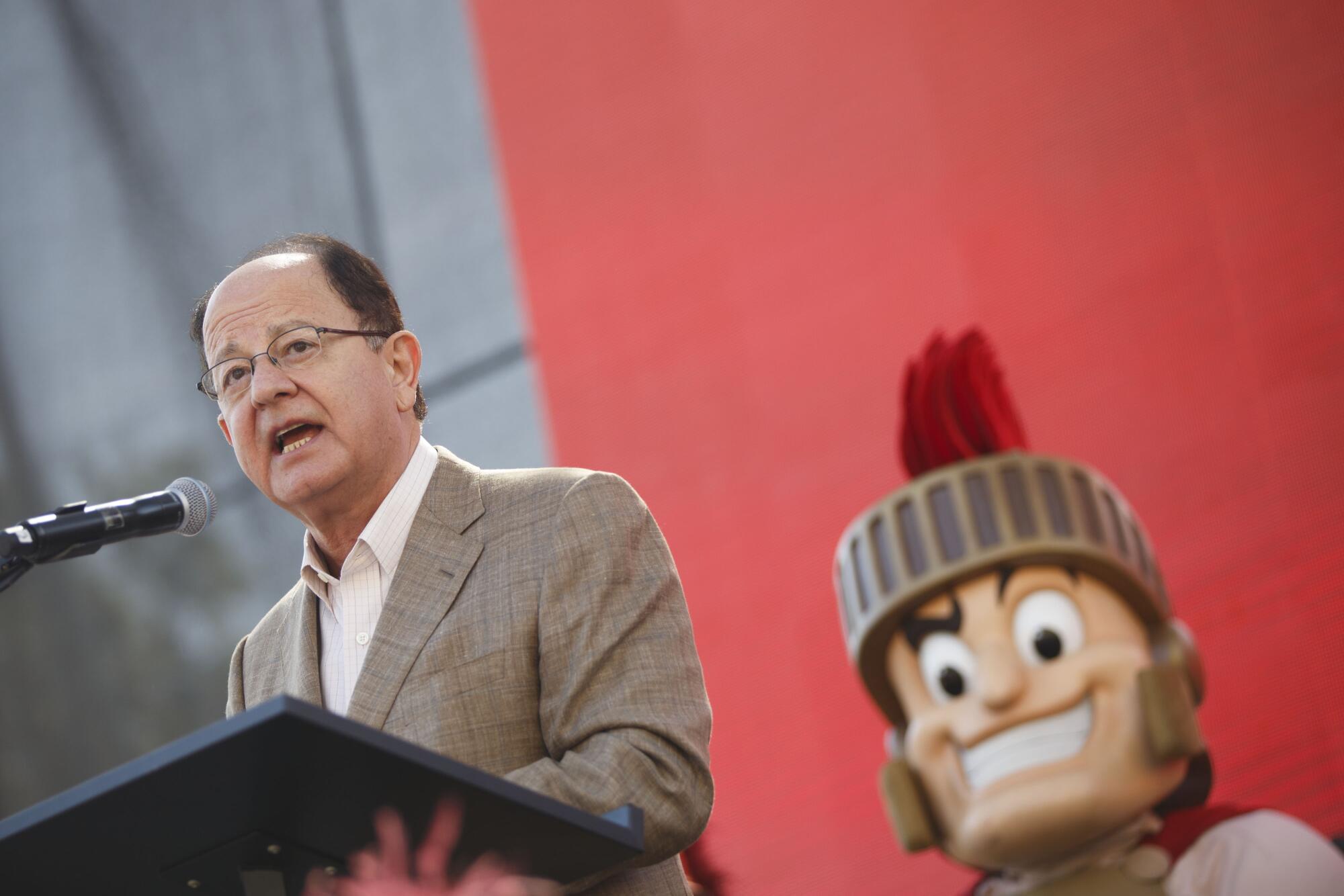
Fundraising became a priority for Haden during his second year when then-President C.L. Max Nikias announced a $6-billion campaign, then the most ambitious in higher-education history. By the campaign’s completion in 2018, Haden and colleagues in athletics had chipped in $730 million.
In those years, “well in excess of 200 college applicants” whose families were rich or had connections at the university were admitted through the athletic department, according to a pretrial filing by Heinel’s criminal defense lawyer. That number does not include Singer’s clients who went through Subco.
Even with other duties that ranged from overseeing the renovation of the Coliseum to firing football coaches, Haden kept close tabs on the admissions prospects of donor children.
“Crap,” he emailed Heinel after learning about the admissions officer’s dim view of the Bangkok energy heir’s academic record. “Got to get the Thai kid in.”
After Subco admitted the son of Palos Verdes businessman Sandy Durko, a former USC football great, as a baseball walk-on in 2015, Haden instructed his fundraising chief to reach out for a donation.
“I already spoke to him and he is expecting [y]our call. Got son in,” Haden wrote.
Durko’s son did not appear on the team roster. Durko did not respond to messages.
***
Concierge service for ‘a very wealthy family’
Under Haden, the athletic department added five additional fundraising administrators. One was Alexandra Bitterlin Reisman, the daughter of one of Haden’s USC classmates.
“I have a very wealthy family whose son wants to leave SMU. He hates it already and wants to be closer to home [from Palisades],” Reisman wrote to a colleague in October 2013. “He’ll apply of course, but could [h]e get in in January?! They will donate big.”
A glance at the USC admissions website would indicate the answer was no. Transfer students generally applied by Feb. 1 for admission in the fall.
John Wilson is seeking the return of a $100,000 donation he made in connection with his son’s admission, along with $75 million in damages.
But for the son of Peter Comisar, the vice chairman and head of West Coast investment banking at Guggenheim Securities, USC offered virtually concierge service so that he could gain admission halfway through the freshman year.
Comisar’s son had dropped out of Southern Methodist University in the fall of 2013 without completing a single course, let alone amassing the strong college transcript USC expected of transfers. Heinel noted in an email that his resume was “very thin,” with high school grades that had fallen below 3.0 his senior year.
“Will be hard to overlook for a spring admission,” she wrote in an email to a USC colleague.
Nevertheless, athletic department employees helped strategize online courses he could take to bolster his resume.
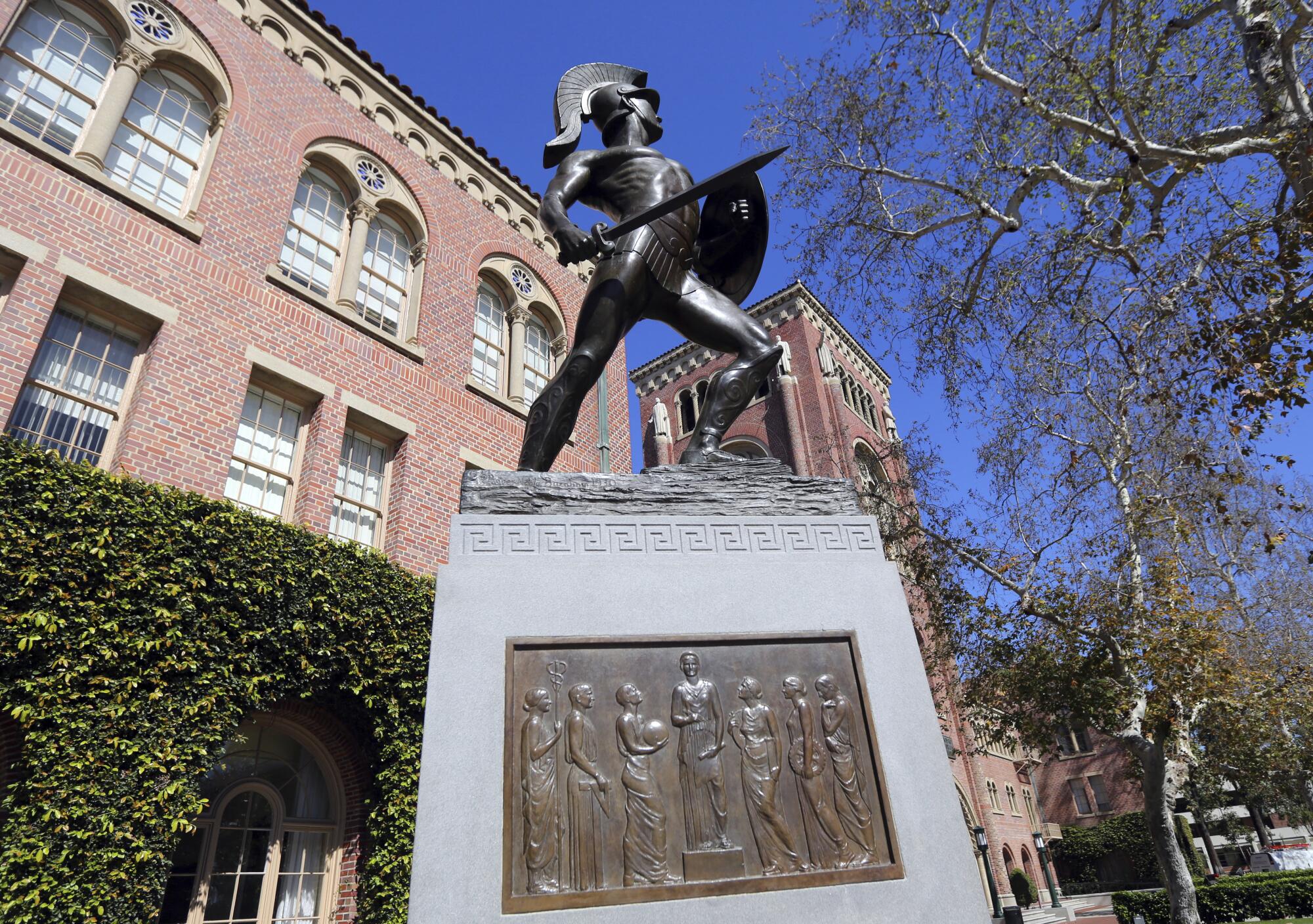
At one point, a Santa Monica City College professor emailed Reisman, who as a fundraising officer was ostensibly uninvolved with admissions, about the teen’s progress in a microeconomics class.
Comisar and his son met with Heinel on campus in November, where emails indicate there was discussion of admission as a walk-on for volleyball, his sport in high school. A follow-up message to Heinel hinted at ambivalence on the teen’s part.
“Just to be clear, nothing would make me happier than to play volleyball at USC,” he wrote. “If you heard something different from me, it was only in the context that I am prepared to work hard, get the grades I need and do whatever it takes to be accepted to USC. It does not have to be on the back of volleyball.”
Subscriber Exclusive Alert
If you're an L.A. Times subscriber, you can sign up to get alerts about early or entirely exclusive content.
You may occasionally receive promotional content from the Los Angeles Times.
But his contacts at USC seemed to view the walk-on route as his best way in.
On the day Heinel was to present the teen’s packet to Subco, Comisar emailed her, “Good luck today in your meetings.” After reviewing his academic record, the committee rejected him.
The athletic department and his father were undeterred. On New Year’s Day, Comisar asked Heinel for an update, noting, “I am actually on vacation with [billionaire financier and USC trustee] Tom Barrack. He asked whether he can help in any way.”
Barrack did not provide an answer to questions about Comisar sent through a representative.
Comisar’s son was admitted less than two weeks later, according to an email an admissions officer on Subco sent to colleagues in athletics and an internal spreadsheet later filed in federal court.
His name never appeared on any volleyball roster. A representative for Comisar said in a statement that the son “attended practices for a few weeks” but stopped “after concluding that he did not have a realistic path to playing time.”
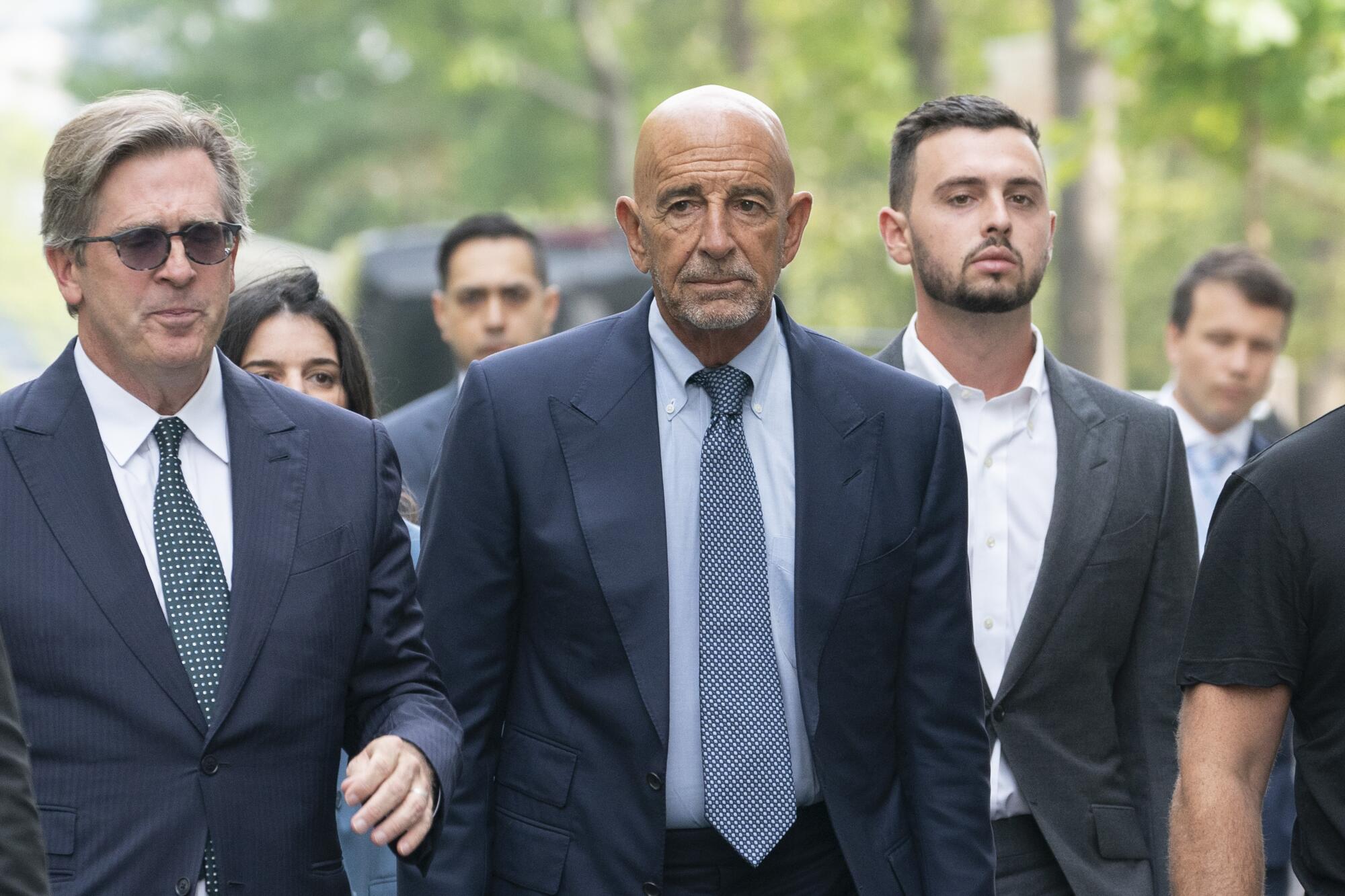
The statement said Comisar’s son had dropped out of SMU for personal reasons unrelated to academics and that “the Comisars had absolutely no knowledge of USC’s behind-the-scenes development considerations.”
“Prior to his admission, USC did not ask for a gift from the Comisars, nor did the Comisars say anything to suggest that they would provide one,” the statement said.
Comisar gave $20,000 to USC in the year and a half after his son’s acceptance, a period in which he served on USC Marshall School of Business’ board of leaders, the statement said.
Heinel, who served four months in prison for Varsity Blues, declined to speak to The Times about Comisar or other applicants. She said of her role in Subco, “I did my job the way I was instructed to do my job and taught to do my job.”
***
‘Geez they like to make people dance’
Whether families had discussed donations with USC before their child’s admission, the records suggest that administrators expected money.
Three young members of the extended Spanos family, the owners of the NFL’s Chargers, got in as walk-ons, including a golfer whose undistinguished high school record in the sport featured a 19-over-par score at a junior tournament. USC had hoped for a $5-million gift from the family, according to a proposal prepared by fundraising staffers, and when a gift failed to materialize, administrators reacted as if they had been duped.
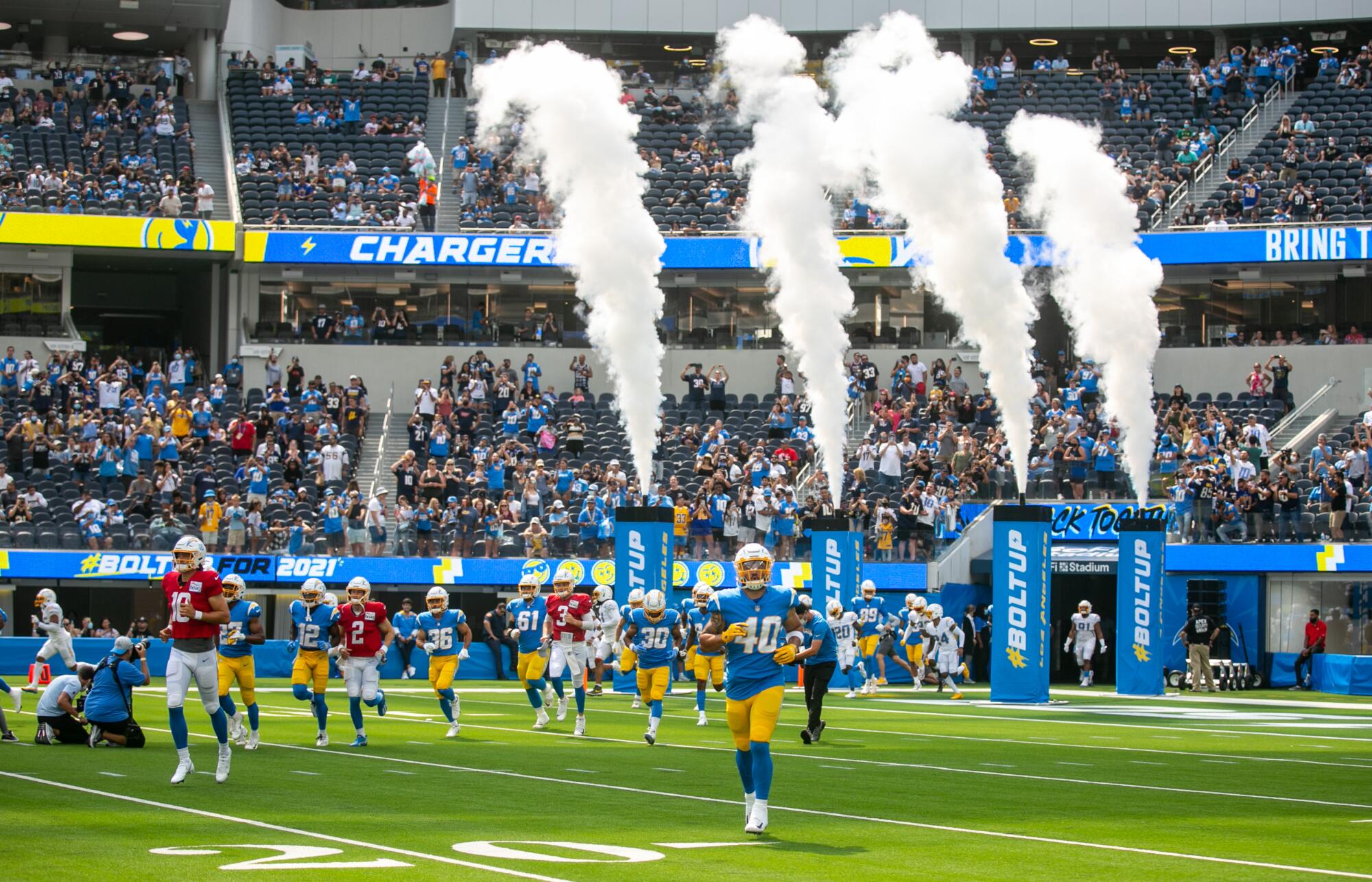
“Their reputation across campus is terrible,” Reisman erupted in a 2016 email exchange in which she called the situation “the worst I’ve ever seen. $0.”
Orr agreed, writing, “Geez they like to make people dance.”
Ryan Stonerock, an attorney for two of the Spanos children admitted to the university, confirmed in a letter that their branch of the family did not give money to USC and said, “Neither they, nor their family, did anything improper whatsoever in connection with their applications.”
An attorney for the third Spanos relative, the golfer, said relatives had “given to USC for years well before and after” his time at the university. The attorney, Vincent Farhat, said in a letter that the family “would never make gifts in exchange for admission.”
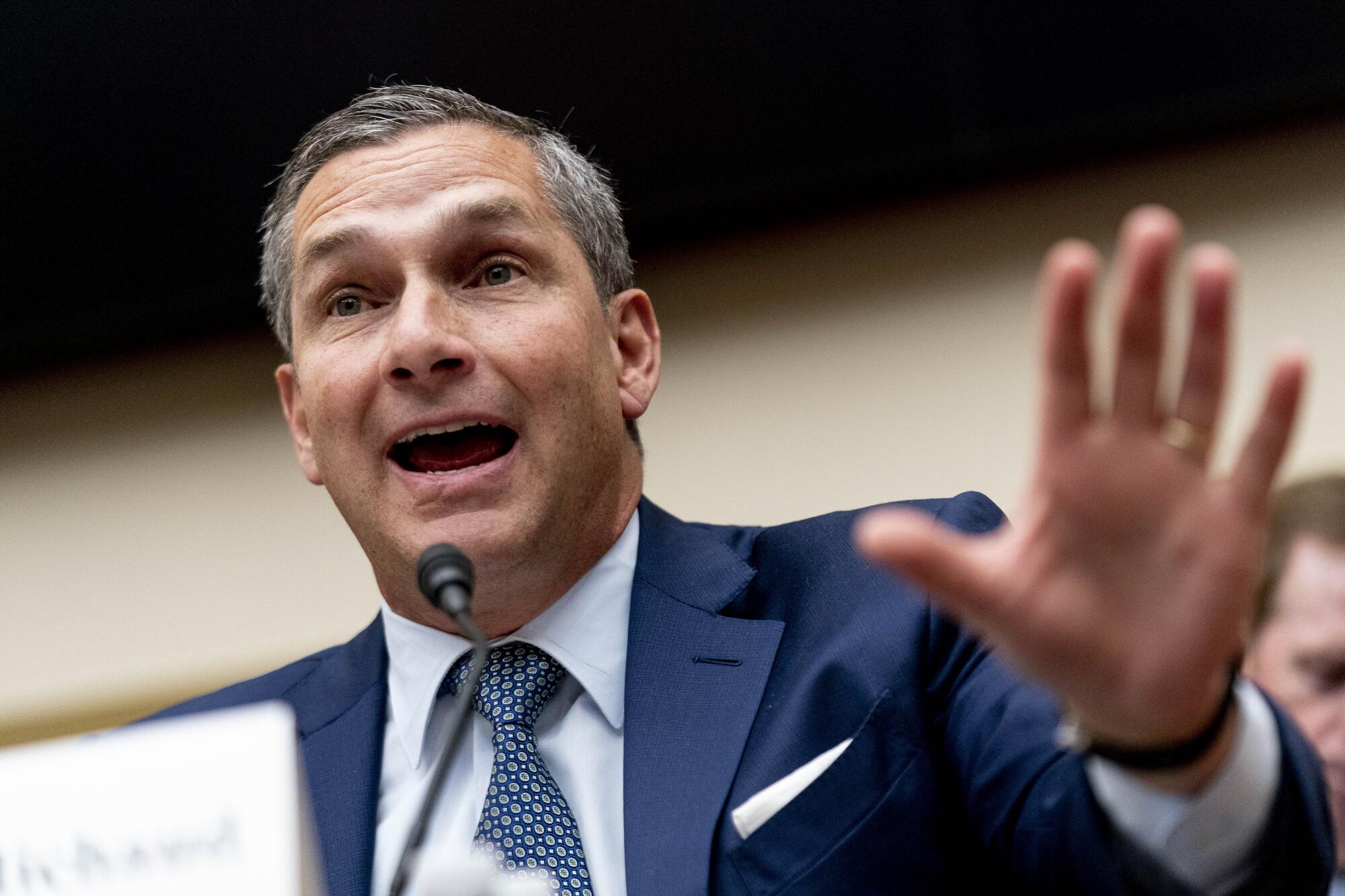
Administrators even contemplated rescinding the admission of a New York investment banker’s child over money. After Subco approved the son of Thomas Michaud as a water polo walk-on in 2014, fundraisers in the athletic department learned their counterparts at the Marshall School of Business and USC’s Manhattan outpost were already courting the family for a donation of $1 million to $5 million.
Worried that athletics would be cut out of a windfall, Heinel told Orr, “If this is not working out the way you planned, I can have Admissions pull the approval.”
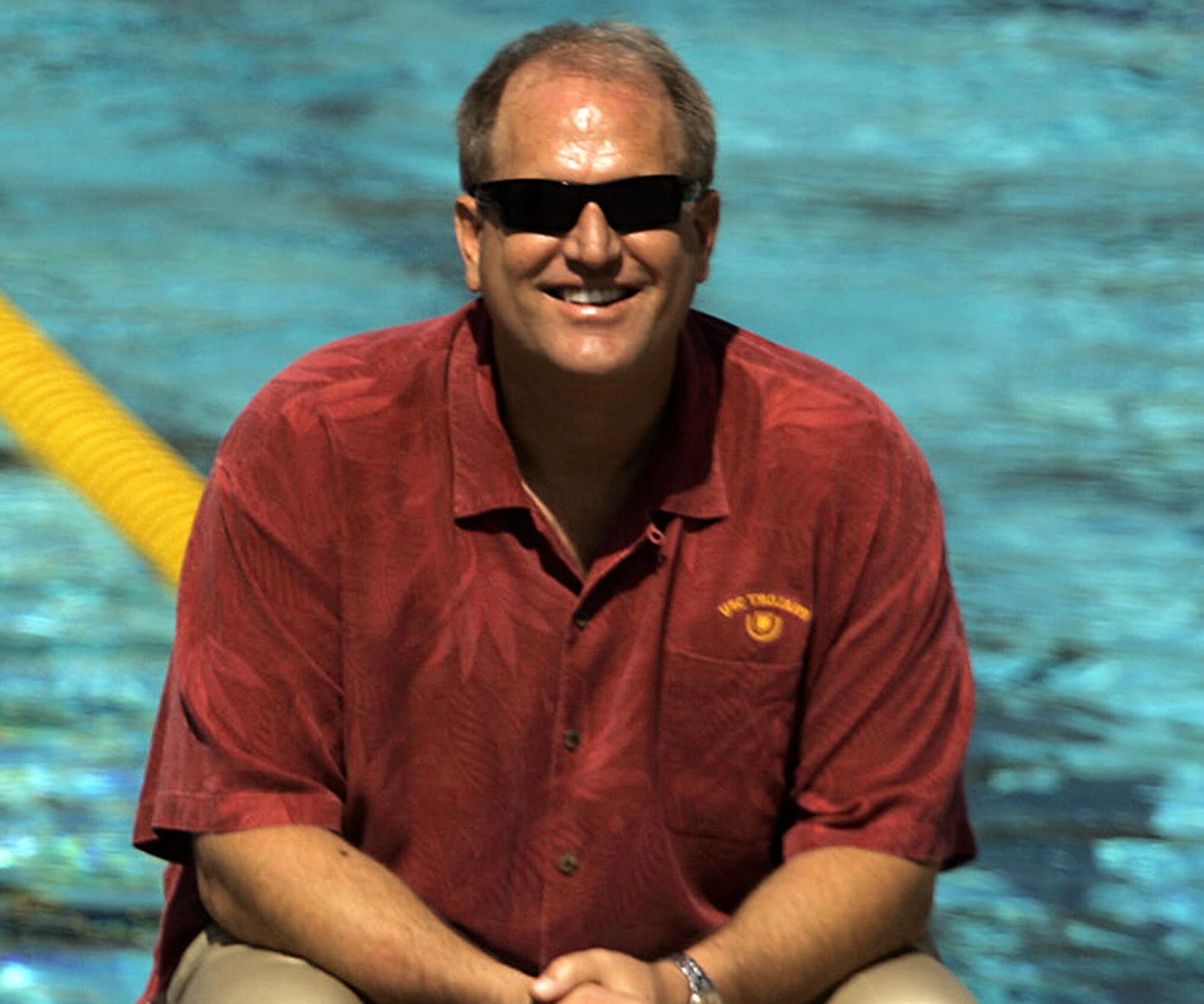
“Really sucks,” he agreed. “Don’t pull we will guilt them …”
Orr told The Times he was referring to guilting other departments within USC and not the family. Michaud did not respond to messages.
His son was a backup goalie on the water polo team for two years. It’s unclear whether the family ever donated to USC.
Not all students accepted as walk-ons fully understood how they had been admitted.
The daughter of James Kim, a donor who had been an All-American golfer at USC, entered the university as a volleyball walk-on despite a stature — 5 feet 5 — unusual for the setter position listed on her application. She never played for USC.
“She knows I have done various things to help her, but I also don’t want her to think that’s the only reason she got in,” Kim wrote in a 2014 email to the golf coach, Zambri, a longtime friend. “Let’s keep the specifics from her … hope you understand.”
“No worries,” Zambri replied. “I’ll keep my big mouth shut.”
Zambri did not respond to messages seeking comment. Kim declined an interview request.
***
What the coaches knew
The stated purpose of Subco was to help Trojans coaches field the best teams possible, but coaches did not attend committee meetings and might never know that donor children were admitted as walk-ons for their squads. Unlike scholarship athletes, who would lose their tuition subsidy if they did not compete, walk-ons were under no obligation to try out or attend practice.
Some coaches openly promoted the system of donor walk-ons. Jason Kennedy, then assistant volleyball coach, wrote in a 2016 email that his roster was full, but he said he would make an exception for the daughter of Bob Gries, a Tampa-based investment fund founder.
“If [Gries’ daughter] is in a position [where] she can walk on and her family can financially support the program since USC is a private school and privately funded, there are always considerations for those sorts of situations,” Kennedy wrote to the teen’s club coach, adding: “USC will basically grant us a roster exemption and fast track [her] to a spot on the team …”
Kennedy did not respond to written questions.
Subco admitted Gries’ daughter a month later and her father pledged $1.5 million to the university. Gries told The Times that a USC administrator asked him for money in the phone call informing him of his daughter’s admission, or in one shortly thereafter. He said he had a long record of philanthropy, including in youth sports, and did not see a contribution as “buying a spot” for his daughter, who he said was talented and hardworking.
“She went to every single practice there was, every 6 a.m. weightlifting session,” he said. She left the team in her first season after breaking an ankle in a longboarding accident.
In 2014, the Trojans football apparatus, from head coach Steve Sarkisian on down, was put on alert when the nephew of a San Marino portfolio manager showed an interest in playing for the team.
Donna Heinel, a former USC administrator who was sentenced to six months in prison for her role in the ‘Operation Varsity Blues’ admissions scandal, has been released.
Andrew Barth was an established donor whose nephew was a talented football player, though not of the top tier USC recruited with scholarships or promises of playing time.
“Our coaches are on him,” Haden assured Barth in October 2014. “Will keep you updated.”
In the following months, administrators conveyed to Barth that they considered his nephew a serious prospect. Among themselves, they discussed the teen in terms of his uncle’s past and future largesse.
“Very important. $10-mil opportunity. Plus the kid can help us,” Haden told athletic department colleagues. He instructed Mark Jackson, the department’s chief innovation officer who oversaw the football program, to “jump on this.” Jackson told Sarkisian in a January 2015 email that Barth’s nephew was “an extremely important admit for us via football.”
“Indeed it is. ... Have a big ask to Andy,” Haden chimed in, later telling the group, “Once he is admitted, I will be visiting his uncle for a gift.”
Haden phoned Barth later that month to personally deliver word of his nephew’s acceptance, according to an email Barth wrote describing the call. The nephew was on the football roster for five years, redshirting his freshman season. He played in one game in 2018, according to stats published by USC.
Barth said his nephew on the football team was “absolutely at the level of other USC players” and noted that he was named in his final year the top defensive player on the Trojans’ scout or “service team,” the backup squad starters play against at practices.
After his nephew’s admission, Barth continued making large donations to USC and seeking special admission treatment for at least four other applicants, including a second nephew. Those students were not admitted as walk-ons or through Subco.
“I was planning on making my next $100,000 payment towards the Endowed Scholarship Club seats,” he wrote to Haden in May 2015. A sentence later he asked, “Any idea on how my nephew[‘s] ... transfer application is looking?”
Barth told The Times that he considered the topics in the email “separate and unrelated items” and that he didn’t expect or receive promises of admission in exchange for his donations.
The $10-million pledge to USC, Barth said, represented a “historic opportunity to be a part of this legendary facility and in no way depended on [my nephew’s] admission.” The internal USC discussion connecting the admission of his nephew to his giving “surprised” him, he said, adding, “I never linked the two in my mind.”
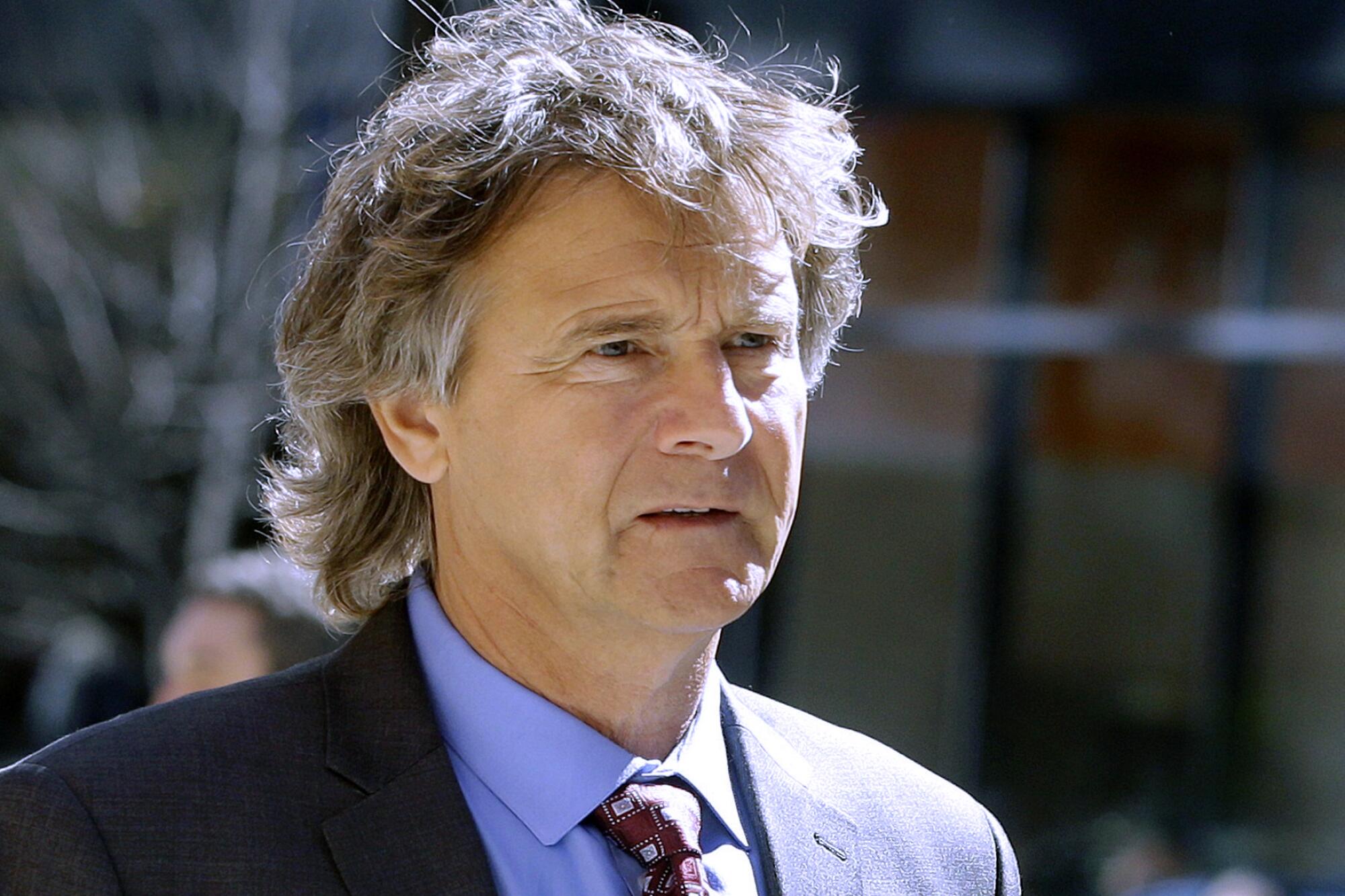
Jovan Vavic, the legendary USC water polo coach, was kept in the loop about some students being admitted for his team, but not others. (He was convicted in 2022 of accepting bribes to secure the admission of Singer’s clients. The case is on appeal.)
After Subco admitted a young member of the Spanos family, the Chargers’ owners, as a water polo walk-on in 2016, Vavic spotted her name on a list of incoming water polo players.
“Who is … Spanos?” Vavic asked his staff in an email. An assistant coach replied, “No clue.”
She went elsewhere for college.
With other applicants, Vavic was leading the charge. The then-CEO of GoFundMe, Rob Solomon, reached out to Vavic in March 2018 about his son, who had not applied to USC but decided late he wanted to attend.
He “has a lot more to offer to USC than the tale told by his transcript,” Solomon told Vavic. “While [he] likely will not pursue competing in college, he loves the game and is very interested in team manager, analyst, videographer, sports commentator, etc., opportunities.”
Vavic immediately asked Heinel to present him to Subco as a walk-on, telling her, “This could be a great donor for us and USC in general.”
But Heinel declined after she reviewed his file.
“He has never even received an A in an academic course,” she explained to Vavic. “This would be a challenge for a high scholarship student-athlete.”
Undeterred, the coach told her that Solomon was prepared to donate $150,000, pleading in an email, “It would help us tremendously. ... Please let me know when can he be presented?”
Heinel wouldn’t budge.
Months later, Solomon was back, this time with the help of USC’s fundraising office in San Francisco. For a third time, Heinel refused and warned a colleague in an email to stay away, writing, “Basically this guy was trying to buy admission.”
Solomon’s son did not attend USC.
He told The Times that he followed the instructions USC employees laid out and never promised $150,000 in exchange for a spot.
“There is no way I would ever spend that kind of money for a kid to go to USC — on top of tuition,” he said.
****
The ‘University of Spoiled Children’
As it has transformed itself from a solid local university to a highly competitive international research institution, USC has tried to shake off its reputation as the “University of Spoiled Children.”
It touts itself as a welcoming home for the undocumented, foster youths, veterans and first-generation students. More than two-thirds of undergraduates receive financial aid, and many families with incomes under $80,000 pay no tuition at all.
University records reviewed by The Times show that, even with this focus on equity and merit, USC administrators gave deference to affluent families.
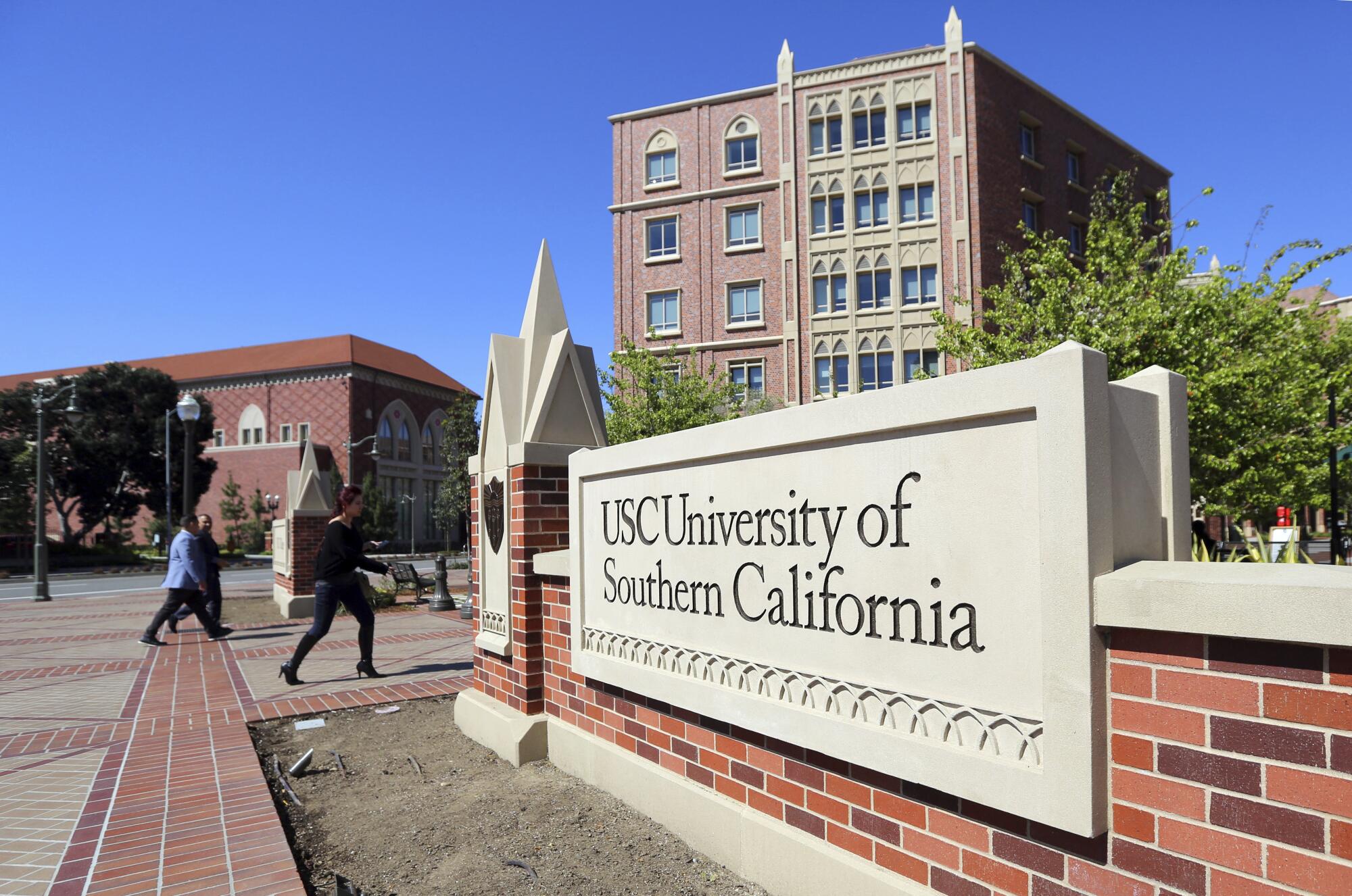
Tony private schools such as Harvard-Westlake, the Buckley School and Marymount High School got a special advance notice of admissions decisions so guidance counselors there could emotionally prepare the students and their parents, the records show.
After a 2018 meeting with staff at Oaks Christian in Westlake Village, Kirk Brennan, USC’s director of undergraduate admissions, agreed to change the rejection of one female student to a “contract” to allow her entrance to USC after a period in which she might attend classes at another institution, according to an email he wrote to his boss, Brunold.
“Thanks, man,” the dean of admissions replied. “I have changed the VIP [spread]sheet to reflect this.”
Rob Black, the head of school at Oaks Christian, told The Times, “I am unaware of any improper ‘pushback’ of any specific applicant’s admissions application, and we do not challenge any college or university’s admissions decision.”
The president, the provost, deans and trustees could designate an applicant as a VIP. About 37% of VIPs gained admission in 2018, about three times the rate of regular candidates, according to USC data reviewed by The Times. Those VIPs marked for rejection by admissions officers would get a second read by Brunold, the admissions dean.
Admitting the rich and famous was a point of pride, at least internally. In an email from Brunold in August 2017 with a subject line “for the nosey folks among us ...,” he listed “interesting” incoming students — the children and grandchildren of politicians, television personalities, business leaders and academics — organized by the field of their bold-faced parent or relative.
***
Varsity Blues scandal puts USC in the crosshairs
For years, the practice of admitting children of donors and would-be donors as walk-on athletes remained little known outside a circle of boosters and rich alumni. One person who thoroughly understood the walk-on system was Newport Beach college counselor Rick Singer.
Singer, the architect of the Varsity Blues scandal, exploited and further distorted the existing system by pocketing exorbitant fees to get children with no athletic ability into USC as walk-ons, sometimes using fake test scores, doctored photos and fabricated sports statistics.
New phone transcripts in the college admissions case provide a detailed look at how the scheme’s admitted mastermind, William “Rick” Singer, pitched his services to potential clients.
Federal prosecutors in Boston brought charges against Singer in March 2019. Prosecuted alongside him were 38 of his parent clients, half of whom stood accused of conspiring to bribe their children’s way into USC.
“I’m shocked by it,” USC’s board chairman, Rick Caruso, said at the time.
What USC did not say was that Singer’s crimes played out in a larger system for donor walk-ons. The most high-profile of his clients, “Full House” actress Lori Loughlin, for example, had two daughters admitted through Subco for crew.
Even before the indictment was public, the university took steps to control what information got out about Subco. It brought on a team of lawyers from Gibson Dunn & Crutcher LLP, led by former U.S. Atty. Debra Wong Yang, who had handled a previous USC scandal involving drug use by a medical school dean.

With Yang or her colleagues at their side, USC employees sat for interviews with federal prosecutors and agents in 2019 and assured them that outside of Singer’s corruption, things were done on the up and up.
“USC would not allow a quid pro quo because they do not do business that way. Donors do not get things in exchange for a donation,” Reisman told agents, according to an FBI summary of her interview. “It would destroy USC’s reputation.”
Sarah Trudell, a senior fundraising administrator, asserted that “gift conversations were only if the student was admitted, not while they were in the application process. Otherwise, this would be a conflict of interest,” according to the FBI’s summary.
Steve Lopes, the athletic department’s chief financial officer, insisted to agents that walk-ons “are selected to join the team because the coach believes the student is a qualified player,” according to an FBI summary.
USC did not respond to questions about assertions made in the law enforcement interviews. Yang declined to comment.
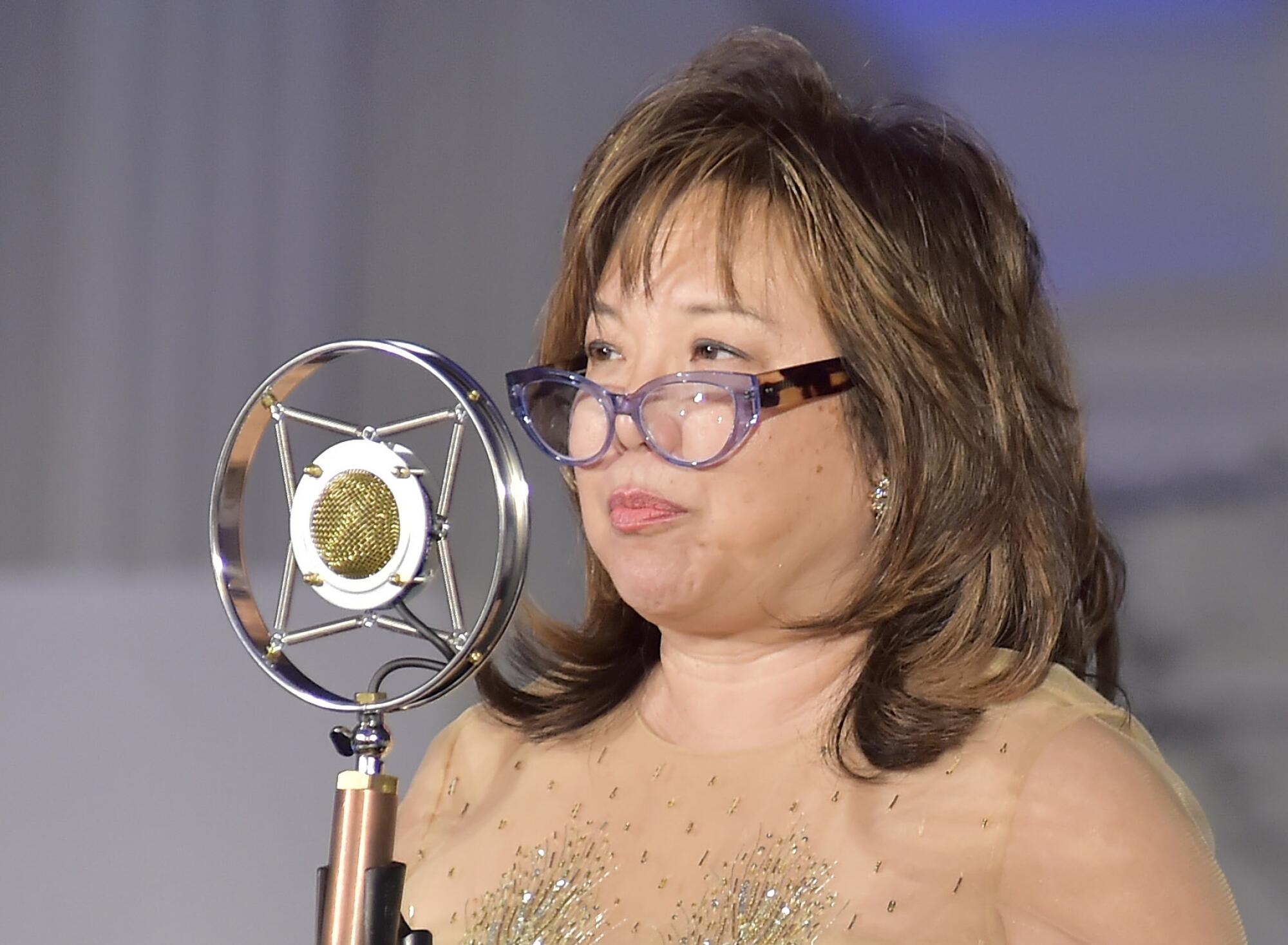
USC announced in 2020 that it had conducted its own internal investigation in connection with Varsity Blues and was parting ways with three senior athletics administrators, Orr, Lopes and Jacobson. Orr told The Times USC did not accuse him of any misconduct when terminating him. Jacobson said he “was not involved in the Subco process,” had nothing to do with Varsity Blues and resigned voluntarily. Lopes declined to comment.
Though the university did not release a full report, it posted a statement on its website that it had uncovered an average of about 12 students a year admitted through Subco who “ultimately were not on a team roster.”
Some were Singer clients, some had legitimate reasons for not playing and some “were falsely presented to the Office of Admission as athletic recruits due to the past giving and/or potential future generosity of their families …,” the 2020 statement said.
USC subsequently rolled out what it termed “best-in-class controls,” among them certification of applicants by head coaches, and recently told The Times it had “successfully prevented any further abuse of our athletics admission process from taking place.”
The 2020 statement, lacking any specifics, might have been the end of discussion about the walk-on path, except for a handful of Varsity Blues defendants who refused plea deals and insisted on their day in court.
In filings, their lawyers homed in on the special treatment USC gave the children of donors and potential donors. In their view, Singer’s clients were not that different from the donor families USC fundraisers courted directly, they argued.
“USC itself channeled candidates for admission who had donor support through the Subco, the VIP process, and sometimes both, just as Singer himself did — regardless of whether those applicants actually had athletic talent,” lawyers for four Varsity Blues parents wrote in one pretrial filing, adding: “It appears the Athletics Department sometimes used the Subco for donor applicants with especially poor academics.”
Parent Robert Zangrillo demanded the university database of VIP applicants with a list of contributions that parents made before and after acceptance.
USC refused, with Yang telling the court that “admissions decisions are based on a wide range of factors … not because of money their parents may have donated.”
Brunold, the admissions dean, backed up the claim in a declaration, writing, “If I had known that a prospective student’s family had donated $50,000 or $100,000 to USC, it would not have affected the Admissions Department’s decision whether to admit the student.”
A magistrate judge who had reviewed some of USC’s internal records scoffed at the assertion.
“I don’t for a second believe Mr. Brunold’s affidavit that he submitted here,” Judge M. Page Kelley said in a November 2019 hearing.
She ruled that Zangrillo was entitled to the records, but she allowed USC to redact the materials to protect student privacy.
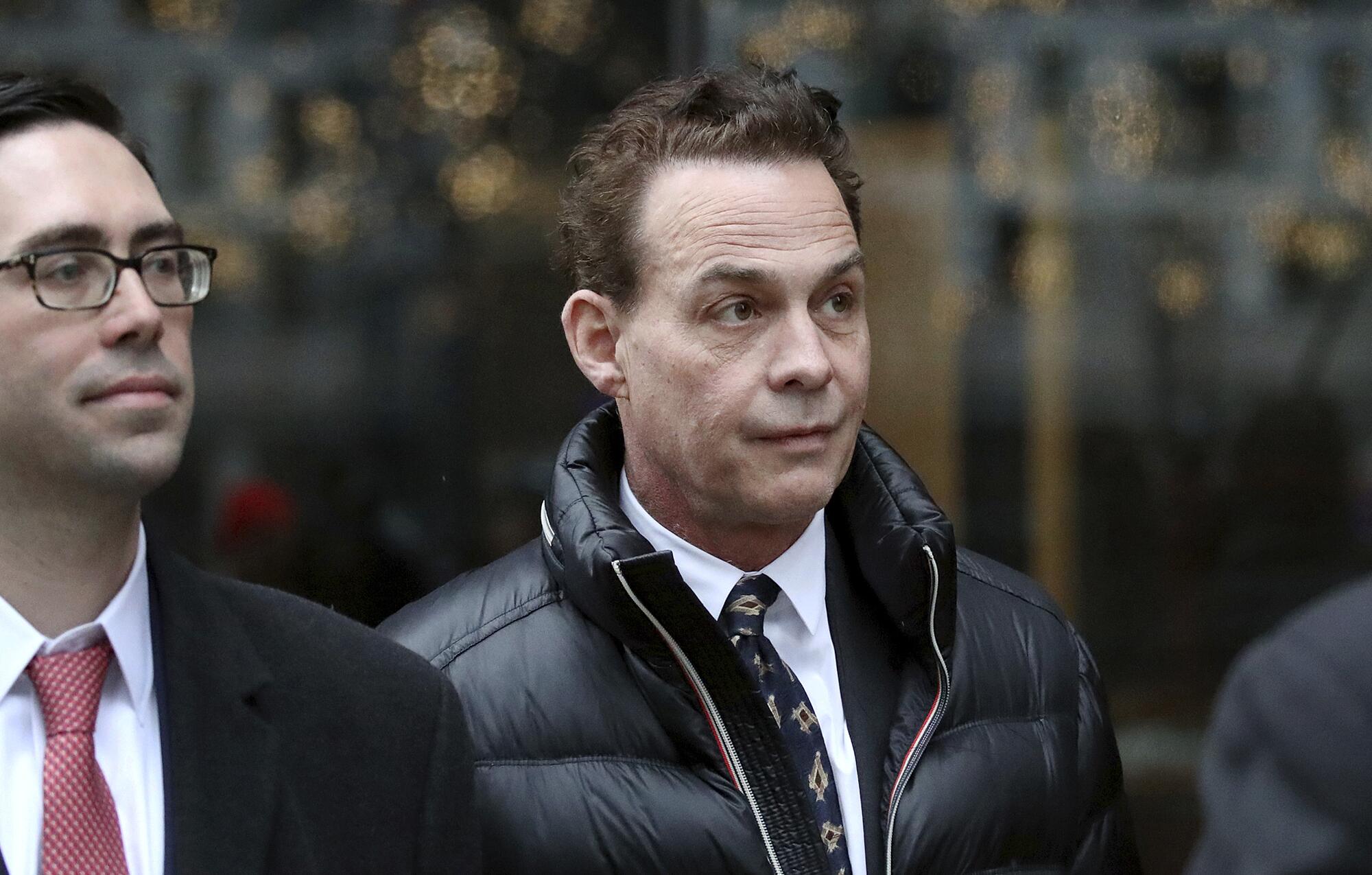
The university turned over heavily redacted documents. One spreadsheet of VIP applicants, for example, had 24 out of 26 columns redacted. A Gibson Dunn attorney told the defense that some of the blacked-out information “only related to ‘test scores or grades,’” according to a court order summarizing events.
While Zangrillo’s lawyer was trying to make sense of the records, he discovered an unredacted copy of the spreadsheet in the reams of documents shared by prosecutors. He could see that USC had hidden not just GPAs and ACT scores, but also detailed information about parents’ wealth, previous contributions and expected future donations, according to a court filing by Zangrillo’s attorney.
Kelly, the magistrate judge, excoriated the university for deception.
President Trump grants a pardon to Robert Zangrillo, a Miami developer accused of securing his daughter’s admission to USC through bribery and fraud.
“USC has made misleading representations about its admissions practices and the redactions to the materials,” she wrote in a 2020 ruling that called university lawyers’ attempts to justify the misrepresentation “unpersuasive.”
USC did not answer questions about its attorneys’ conduct.
Before a trial in which USC’s practices might have become public, then-President Trump pardoned Zangrillo. In a news release announcing the pardon, the White House credited USC trustee Barrack, a confidante of the president, among others, for supporting Zangrillo’s 2021 pardon. Reached by The Times that day, a spokesperson for Barrack said he denied any involvement.
***
A sanitized portrayal of Subco
On Oct. 1, 2021, Orr was called as a witness at the trial of two Varsity Blues parents in Boston. At his side was a lawyer paid for by USC.
“Were walk-on students sometimes admitted through the subcommittee on athletic admission for reasons other than athletic talent?” a defense attorney began his examination.
“On the advice of my counsel, I assert the 5th Amendment right to remain silent,” Orr replied.
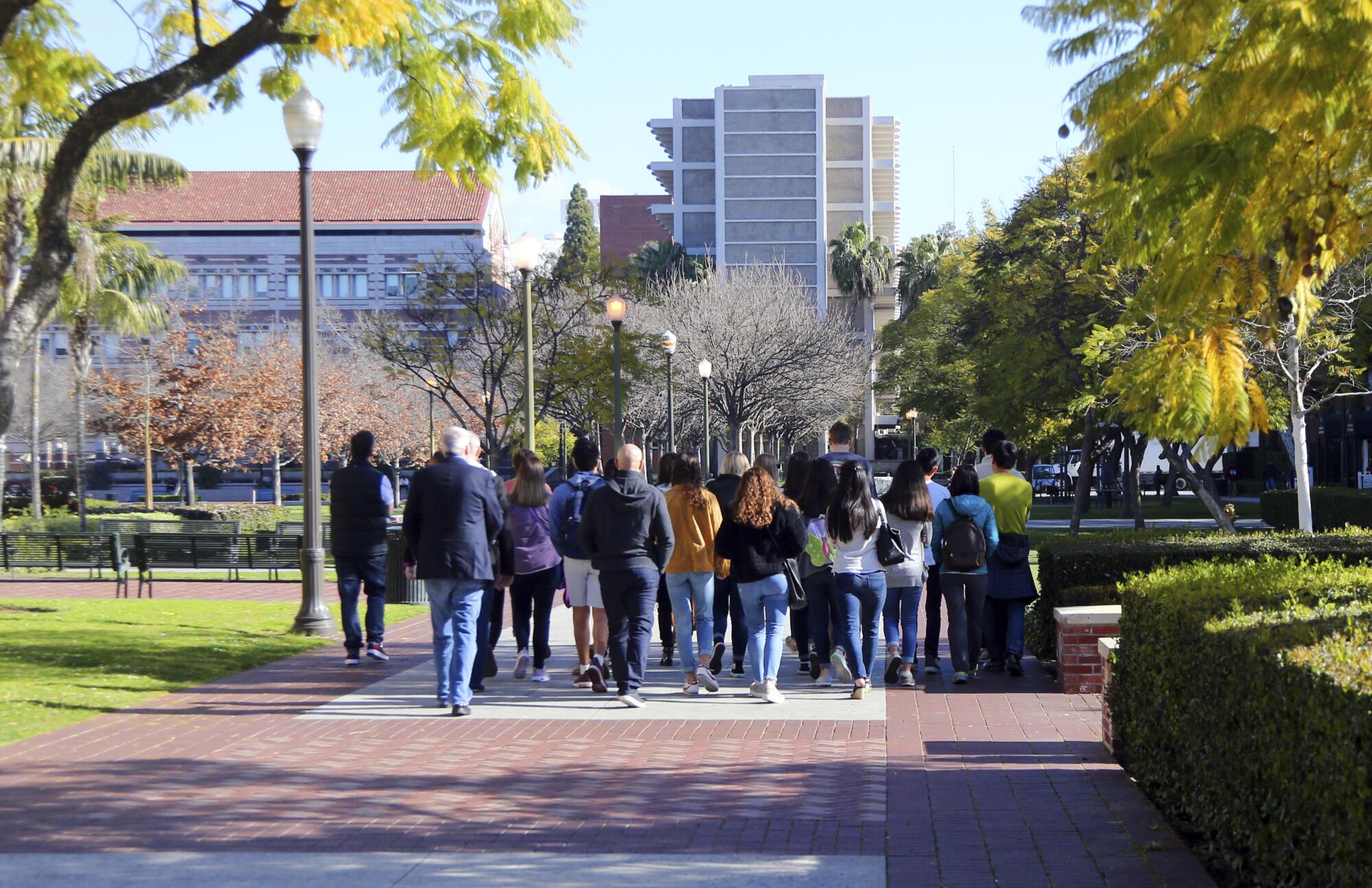
Only three of the 55 people charged in the admissions case actually went to trial, and each attempted to bring before the jury evidence about Subco and how USC approached VIP applicants in general.
The university resisted, as shown in dozens of motions and at hearings. Defense attorneys served at least 27 subpoenas on current or former employees, but lawyers for USC and the individuals insisted most of the testimony was unnecessary.
Reisman and two fundraising colleagues told the court through their lawyer, “USC did not use Subco as a fundraising tool.”
Lawyers for Haden cited medical issues in sealed documents contesting his appearance at the trial and said that even if he could make it to the witness stand in Boston, nothing he would say would help the defense.
“He made it clear to USC staff during numerous staff meetings that they were not to link donation to the admissions decisions,” Haden’s lawyers wrote. “Coaches were supposed to recruit real players in order to win games, not sell spots.”
Asked to reconcile those statements with the admission of donors’ and prospective donors’ relatives, his attorney, Brandon Fox, sent a statement to The Times that said, in part, “Pat Haden had no role in the admissions department, never attended a single Subco meeting, and routinely advised parents and staff that donations could not be linked to admissions. ... The fact that Mr. Haden was never called as a witness in any trial shows how far removed he was from any wrongful activity.”
Judges mostly agreed with USC, ruling that much of the material about VIP and Subco applicants should be kept out.
“This trial is not going to be about the general admissions policy of the University of [Southern] California or the method it uses to admit students,” said U.S. Dist. Judge Nathaniel Gorton, who was presiding over the trial of parents John Wilson and Gamal Abdelaziz. “USC is not on trial here.”
The only USC administrator to testify was an assistant dean of undergraduate admissions. Rebecca Chassin was four rungs down from the top of the department, and unlike Brunold, her boss’ boss, she had few dealings with the fundraising or athletics staff.
Testifying about how Singer’s clients had sneaked through Subco with falsified packets, Chassin gave an answer that also explained how some underqualified children of donors slipped by the committee.
“I’m trusting the athletic resumé that’s been included in the Subco packet which I believe has information from the coach about their athletic talent and about the role they’ll play on the team,” Chassin testified, conceding, “I don’t really know too much about athletics at the high school level or really at any level.”
Called to the stand by the defense, Orr and Lopes refused to answer questions about the courting of donors’ children.
“Did the USC athletic department exchange preferential admissions treatment for donations to the University of Southern California?” asked an attorney for parent Abdelaziz.
Lopes, who worked in the athletic department for 35 years, said, “On the advice of my counsel, I assert my 5th Amendment right to remain silent.”
After questioning both former USC employees privately, the trial judge announced that “each witness has satisfied the Court that there is at least a reasonable probability that they would face some authentic danger of incrimination were they to testify.”
Orr told The Times that he wasn’t concerned about incriminating himself but was simply tired of involvement in the legal proceedings, saying, “I just didn’t want it to continue.”
Others signaled they would also refuse to testify, including two assistants to Heinel who had prepared Subco packets. USC said it followed California law and standard employment practices in covering the legal fees for current and former employees. The university said it did not tell the attorneys what strategy to pursue or whether their clients should testify.
Both parents were convicted, but an appellate court later threw out the charges against Abdelaziz and all but one of the counts against Wilson.
****
‘It is important to him to be on the roster’
The son of Ratanavadi, the Thai energy tycoon who had given $3 million, was on the USC golf roster for four years.
Team photos show Ratanavadi’s son in the front row, beaming in a cardinal shirt alongside men who would go on to PGA careers.
He participated in just two collegiate tournaments, finishing 80th and 84th. A family spokesperson presented The Times with what she said was a testimonial from an unnamed coach suggesting that he had been kept on the team for reasons beyond athletic ability. “He’s a smart, funny kid. The guys enjoyed being around him,” the testimonial read in part.
In the years his son attended college, Ratanavadi continued writing checks to USC, including $1.5 million to support needy students and $1 million for the Coliseum renovation, according to the family spokesperson. His company, Gulf Energy, took on USC interns and Ratanavadi, himself an alumnus, joined the board of councilors at the university’s Annenberg School of Communications and Journalism.
Emails reviewed by The Times show that by Ratanavadi’s son’s senior year, his continuing presence on the golf team had become a topic of discussion in the athletic department. Zambri, the golf coach, was pushing to expand his roster for players who could contribute to the team.
Heinel told him that increasing the number of slots was not permitted and recommended cutting Ratanavadi’s son. She told him in an August 2018 email, “Since this gentleman is not even coming to practice, competing in tournaments or will be present during your competitive season you would not have him on the squad.”
Zambri balked at jettisoning Ratanavadi’s son, telling Heinel, “I think, for whatever reason, it is important to him to be on the roster. Which means it is important to [his father] Sarath.”
The son received a bachelor’s degree from USC’s communications school in 2019, making the Dean’s List one semester and, according to the family spokesperson, earning a 3.5 GPA. He now runs a private golf club outside Bangkok owned by his father.
More to Read
Subscriber Exclusive Alert
If you're an L.A. Times subscriber, you can sign up to get alerts about early or entirely exclusive content.
You may occasionally receive promotional content from the Los Angeles Times.
